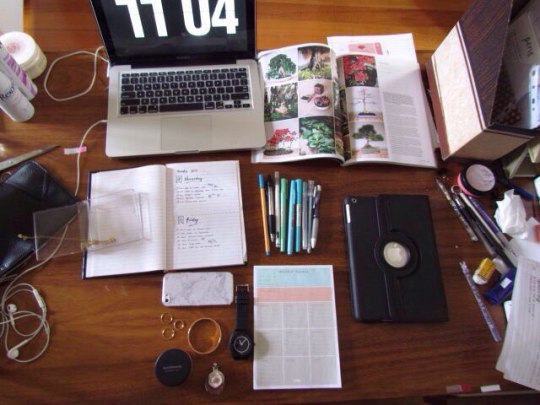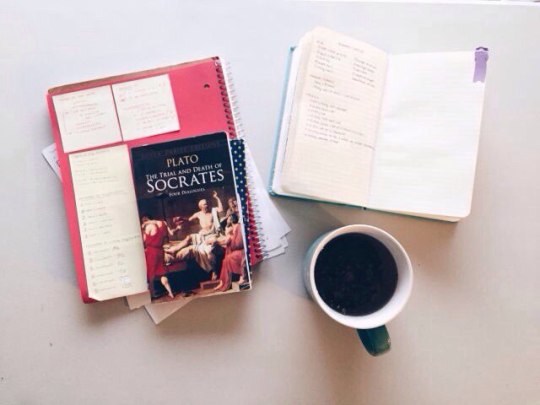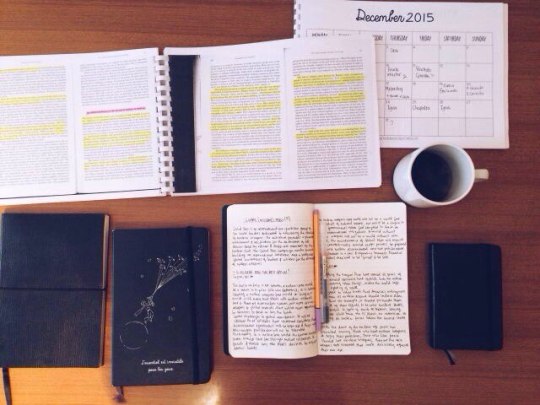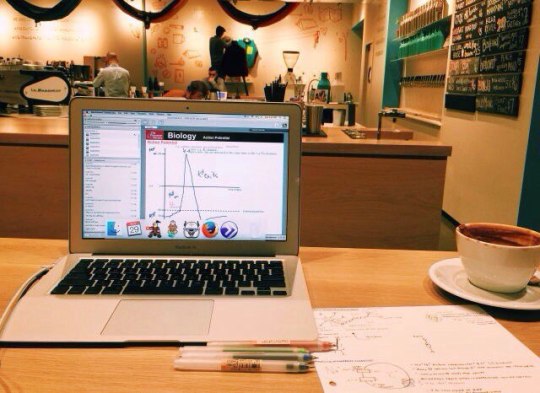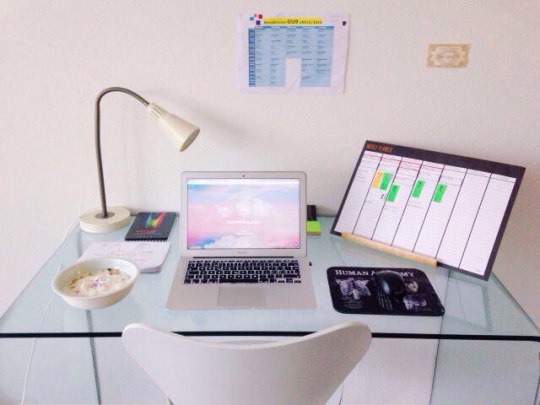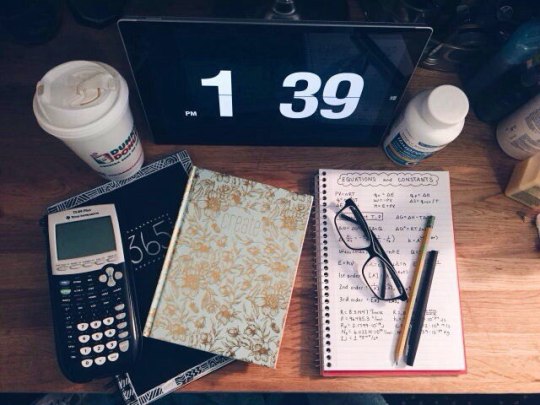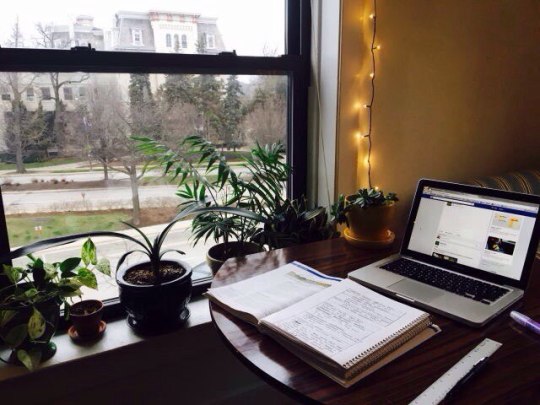Photo

Study Notes
The Art of Highlighting @studygene
How to Avoid Vomiting a Rainbow a.k.a. Colour Coding Your Notes @fuckstudy
Guide to Study Guides @etudiantt
How I make study guides @coffeesforstudiers
Make Accessible PowerPoints @gojikas
Guide to: Mind Maps @study-well
How to Mind Map @study-nsp
10 Mistakes when Studying @howtostudyquick
How I Take Notes @acollegegirlsays
Note Taking System @theorganisedstudent
How to Annotate @tbhstudying
How I Make Notecards! @cw0630
How I Format and Use Flashcards @illolita
Tips for Flashcards @tbhstudying
Studying
Effective Studying @studybudyblr
Apiarianbelljar’s Guide to Studying in Bed @apiarianbelljar
How to Stay Focused @elkstudies
101 Study Tips @study-early
Study Tips for Lazy People @riseandstudy
Studying For the Lazy @areistotle
A Stash of Tiny Study Tips @justagirltryingtostudy
How to Study Like a Harvard Student @yhbgk
How to Earn More A’s: Tips From an Honours Student @abs-studies
How to Focus @studyocracy
Study Tips From: an MIT Student with a 5.0 @academicheaux
Study and Exam Tips @workhardlikegranger
Textbook Studying
How to Take Notes: from a Textbook @staticsandstationery
Studying from textbooks with PsychedAboutStudying Part 1 @psychedaboutstudying
Studying from textbooks with PsychedAboutStudying Part 2 @psychedaboutstudying
Studying from textbooks with PsychedAboutStudying Part 3 @psychedaboutstudying
Studying from textbooks with PsychedAboutStudying Part 4 @psychedaboutstudying
A Visual Learner’s Guide to Textbook Note Taking @stxdybug
At School
How to do Well in a Class Taught by a Crappy Teacher @coffeeandstationery
Annotating Effectively @hideandstudy
How to Take Effective Notes in Class @emmastudies
Staying Awake/Focused in Class @mathbrain
Class Presentations and Speaking in Public @nerdytravelingstudent
Public Speaking Tips @inkdippedquills
Study Tips for the New Semester @studyingandlattes
Homework and Essays
Clichés to Avoid for Essays @appblrgirl
How to: Write a Killer English Essay @izzystudies
The Discursive/ Argumentative Essay @areistotle
The Narrative Essay + The Descriptive Essay @areistotle
How to Write a Strong Essay @collegemania
How to Write the Perfect College Essay @sara-laughed
How to Tackle Big Projects @study-studymore-studyhard
Research Tips @studyingiscool
Who Needs Wikipedia @procrastinatioff
Exams
How to: Remember Everything for a Test @getstudyblr
Emergency Study Plan: My Test is Tomorrow and I Haven’t Started Studying @getstudyblr
How to Mentally Prep Yourself for a Test @eruditicn
How to Study for a Test @tbhstudying
How to Improve Bad Grades @tbhstudying
The Ultimate Guide to Final Exams @sara-laughed
How to Make a Study Plan for Finals @sara-laughed
How to Stay Calm and Reduce Stress During Finals @sara-laughed
Organisation and Motivation
Minimalist School Organisation @deinterlacing
How to Catch Up on Missed Work @munirastudies
How to Make the Best Use of Your Time @tbhstudying
Productivity Resource List @lifting-books
16 Pieces of Real Advice for 2016 @azumeryl
How to Start Working When You Really Don’t Feel Like It? @strive-for-da-best
Beating Procrastination @to-work-or-not-to-work
Tips for Getting Your Motivation Back @liveandstudy
How to Make a Great, Simple Google Docs Agenda @saturdaystudying
Concentration Masterpost @study-star
Focus & Motivation @coffeeandrevision
3 Ways to Set Study Goals + Goal Setting Tips @abs-studies
Breaks/ Holidays
How to Make the Most Out of the Christmas Holidays @studysophical
Planning for Breaks/ Holidays @studybuzz
Saturday Study Tips @alexandraleighc
Study Breaks @makingmyselfstudy
Avoiding Burnout @studybuzz
Online
Online Courses: A Guide @gracelearns
9 Free Online Courses You Should Take @johnnylist
My Favourite Productive Chrome Extensions @living-the-ib-life
Subject Specific
Math Studying Technique @lunastudy
How to Study a Mathematics Textbook @collegegirlbyday
Tips for Studying Chemistry @chemistrynerd2020
Biology Help @abs-studies
Studying Biology @joolshallie
Guide to Reading Literature @eggnotes
Annotating (English) @areistotle
Health
Dealing with Failure @fuckstudy
Study Guide- for Health @jwstudying
Stop Comparing Yourself to Others @gryhffindors
What to Do When You Don’t Know What to Do @nyctophiliaccarly
What to Do on a Bad Day @maryplethora
How to Stay Productive During Sick Days @studysophical
Overstudies Tips #1 For Getting Better Rest @overstudies
How to Take Constructive Criticism @howtomusicmajor
Six Reasons Why You’re (Going To Be) Okay @howtomusicmajor
19K notes
·
View notes
Photo

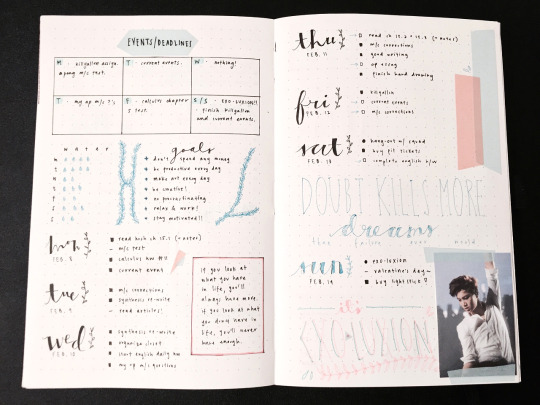
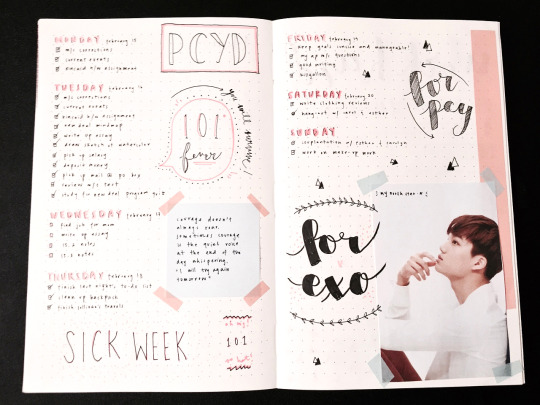
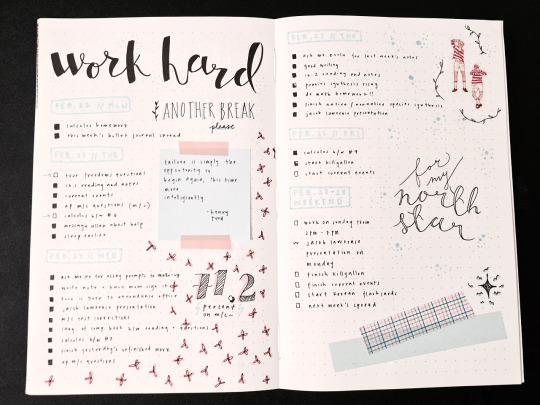
[fri. 26 february] here are my spreads from the past few weeks! i need to get used to posting more original content because i’ve only been reblogging lately haha ;; much of my inspiration came from one of my favorite studyblrs, @studytildawn! i’m still recovering from my fever, slowly but surely, and working rigorously for the past few days. i really do need a new lamp though goodness, does anybody have any recs for good reading lamps? thanks!
4K notes
·
View notes
Photo
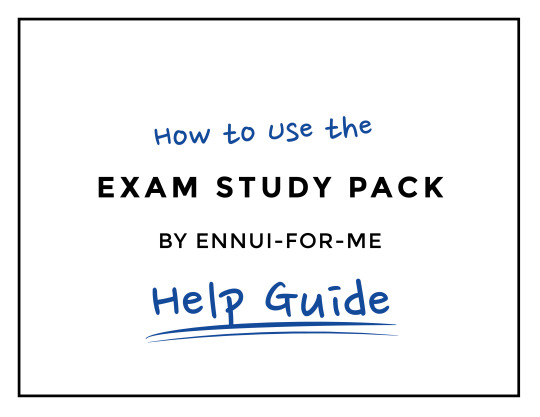
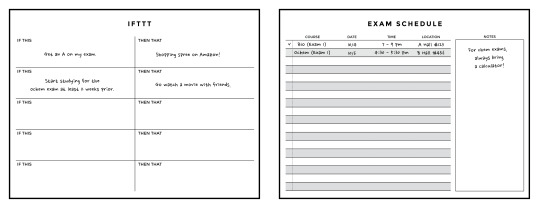
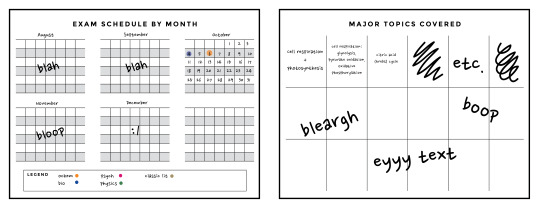
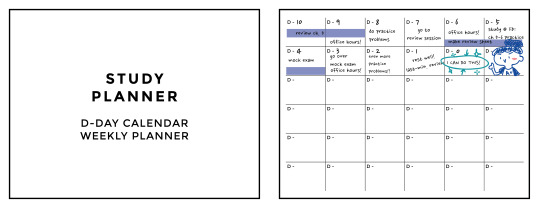
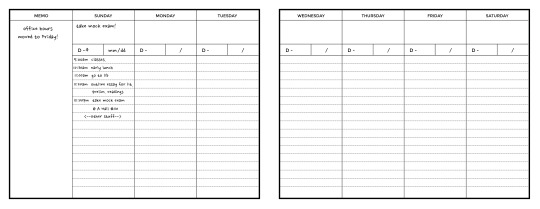
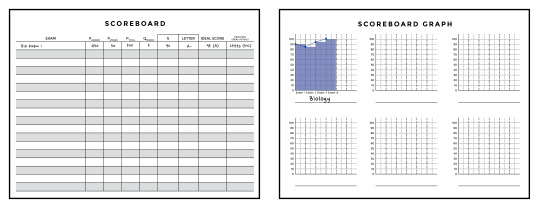
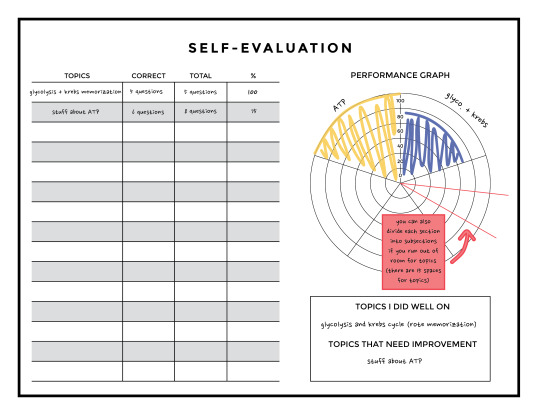
How to Use the Exam Study Pack: A Help Guide
Here’s some suggestions on how to use my exam pack printable in case you needed some inspiration. Be creative! Have fun with your studies!
9K notes
·
View notes
Photo
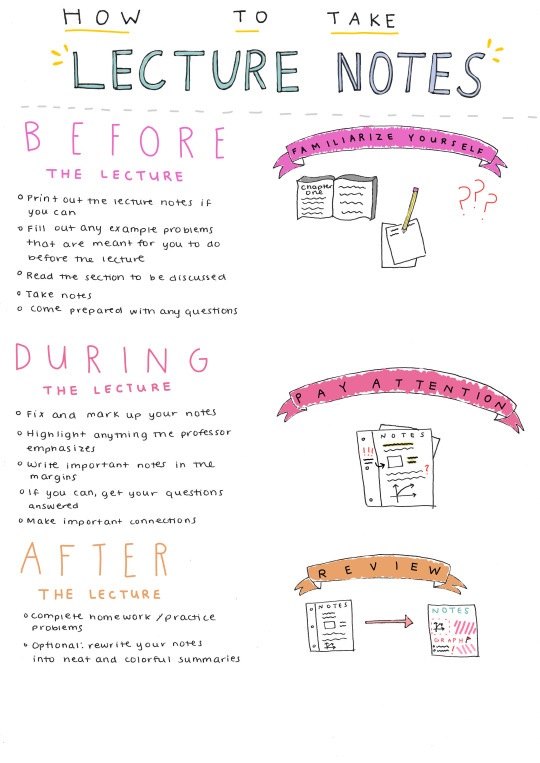
How To Take Lecture Notes
The professors sometimes ask for students to print out lecture slides or take notes before class, so here are some ideas on what to do before, during, and after the lecture. Of course, these don’t have to be followed exactly as written, so you can use what works best for you. :)
29K notes
·
View notes
Photo
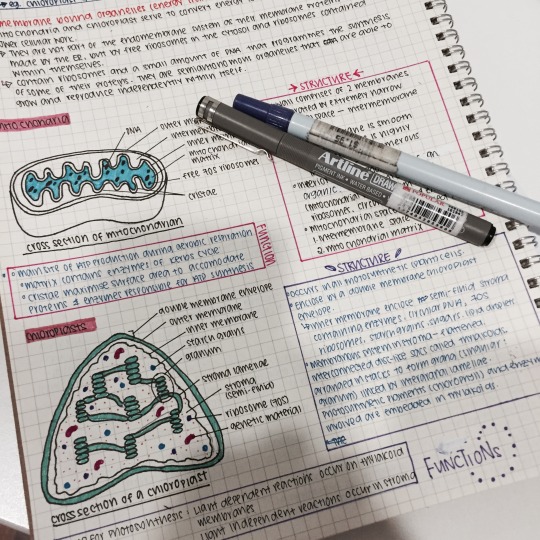
My notes on cell structure and organelles 💫
309 notes
·
View notes
Text
Common mistakes when studying for exams:
1. Not starting early enough
While many students intend to begin studying for final exams a couple of weeks beforehand, that timeline often slips as exams approach. After several days of convincing yourself, it will be OK to skip this one day and get started tomorrow, suddenly what was supposed to be a week of studying turns into one or two frantic nights of cramming. Studying for exams often takes more time than you might anticipate, so make sure you get started early!
2. Studying in chronological rather than priority order
One common approach to studying for exams is to sit down and look through all of the notes from class in chronological order. In addition to being a very passive study strategy (more on this below), it also puts you at risk of running out of time to review the material you learned most recently, which is often emphasized more heavily on the final exam. Instead of studying in chronological order, try studying in priority order, spending the majority of your time on the information that will be most important for you to know for the test.
3. Practicing in the wrong format (not how you’ll be tested)
I often find that students will study the same way for all of their exams, regardless of the format. For example, they might study for history by making flashcards for all the key terms in their notes. This might be a great strategy for a test that is mostly multiple choice and matching questions…but it could get you into trouble if your test is the mostly short answer and essay questions that require you to answer “why” and “how” questions about the bigger-picture concepts from the class. If you want to be prepared for your exams, you need to make sure that the way you are studying for your test is similar to the way you will actually be tested on the material.
4. Reviewing information you already know
Even when students are testing themselves and using active study strategies, they often spend the majority of their time on topics they already know. Doing problems you are familiar with and know how to solve is more comfortable, and gives you a nice boost in your self-confidence. The problem with this approach is that you often end up running out of time to work through the challenging problems that you don’t know how to solve…and those are the ones that you end up missing on the test. Don’t waste your time studying things you already know! Once you’ve confirmed that you understand and can answer questions about a certain concept, check it off your list and move on to something more challenging.
5. Memorizing, rather than understanding I frequently see students who have been studying by trying to memorize all of the facts from a class, rather than truly understanding the underlying concepts. Memorizing can work well in some classes, especially in elementary and middle school, but it often backfires in more advanced classes. If you’ve memorized a definition but don’t really understand what it means, then as soon as the information is presented in a slightly different format, or you’re asked to apply it to a new type of problem, you will have no idea how to proceed. Rather than memorizing the information from your classes, use study strategies that encourage you to understand it. Explaining ideas out loud in your own words, or teaching them to someone else, are great examples of study strategies that promote understanding.
6. Calculating Your Final Grade A lot of students try to figure out what effect different final exam grades will have on their final grade in the course. (For example: “I have to get at least a 90 on the final to get an A in the class.”) Indeed, almost every e-mail I get asking for exam preparation tips seems to be prefaced with some range of scores the student has to hit in order to get some desired final grade.
Don’t do this! No good can possibly come from such a superficial focus on the numbers. It will add stress. This, in turn, will make it harder for you to execute a reasonable, specific, and efficient study plan. Also, it’s just plain crass. You don’t want to be that person…Forget about your G.P.A., and focus, instead, on how you can best prepare for the specific challenge in front of you. If you screw up, you screw up.
Source
16K notes
·
View notes
Photo
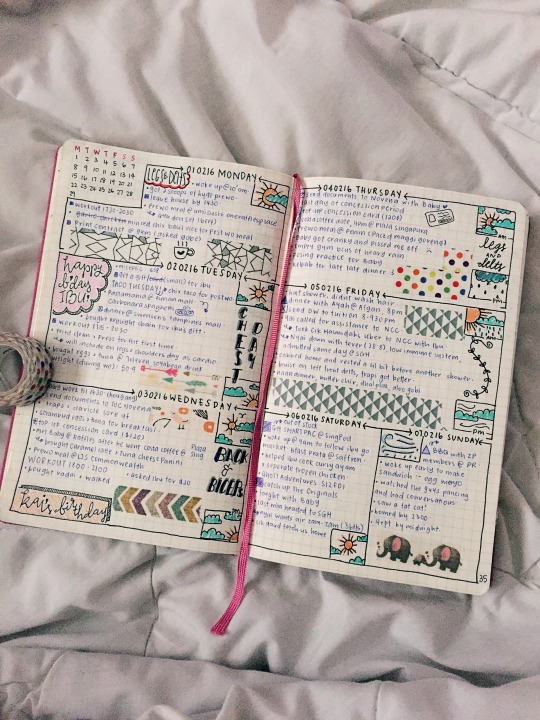
9.2.16
I get bored sometimes for using fineliners for everythingggg so i decided to go back to the classic blue ballpoint pen and have never been happier!📝
6K notes
·
View notes
Photo

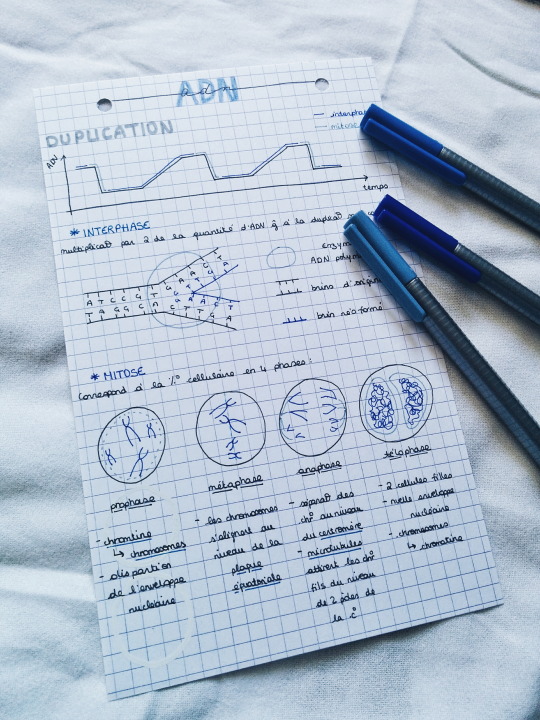
02.07.2016 // 4:01pm // New Staedtlers
Today I should have done a picture of my work space for the @liveandstudy challenge, but it would have looked awful so instead I chose to show you my favourite combo of the staedtler fineliners 🙃
As you can see I did a nice card on DNA and how it duplicates :) the title’s font was inspired by @intelectum ^^
2K notes
·
View notes
Photo
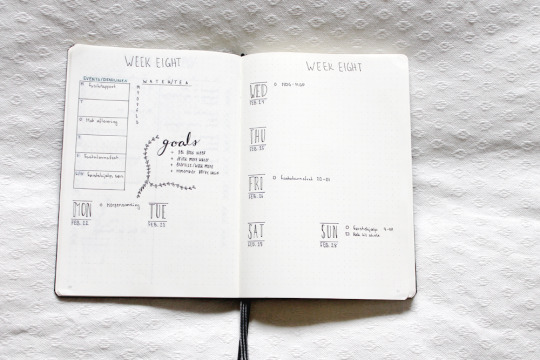
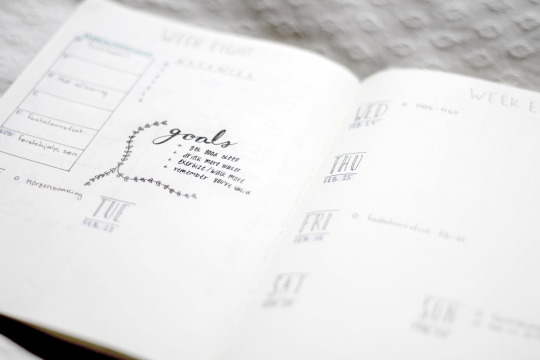
enjoying my winter break and preparing for a new week even though it’s only Thursday
1K notes
·
View notes
Photo
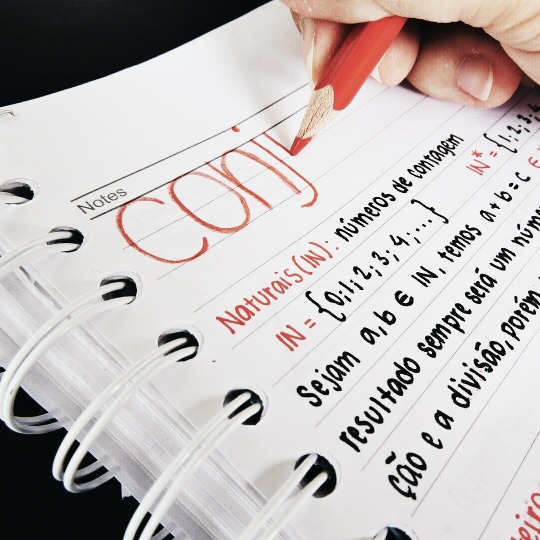

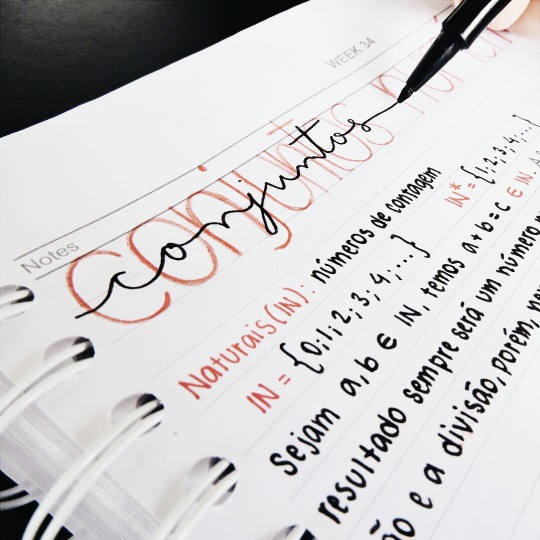
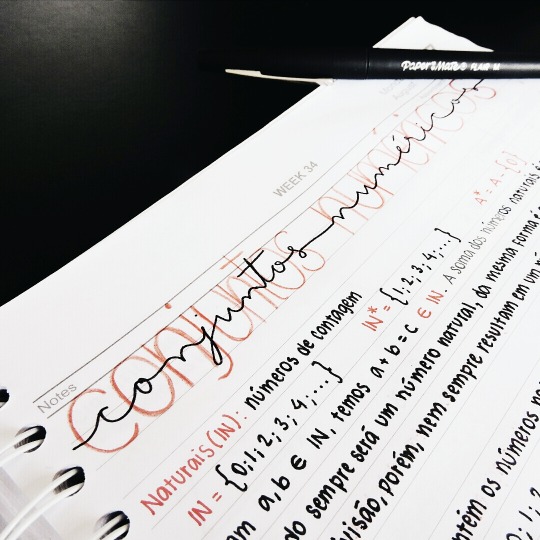
Thursday, February 18.
Working on my title. I used a red color pencil and Paper Mate Flair pen.
4K notes
·
View notes
Photo
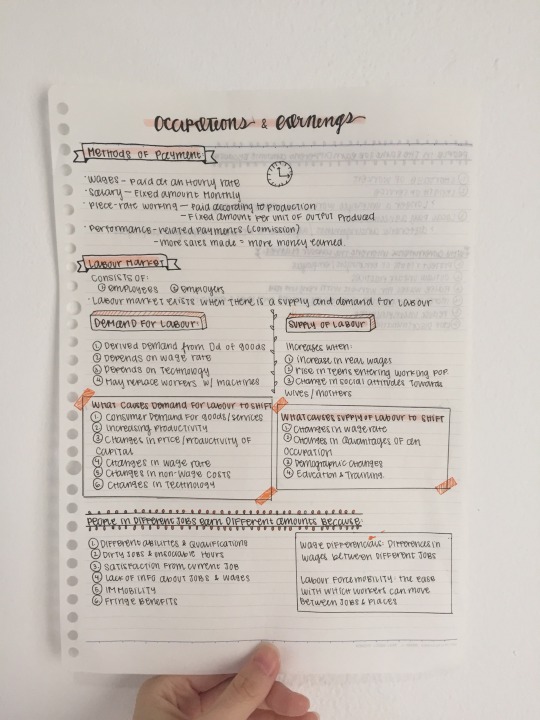
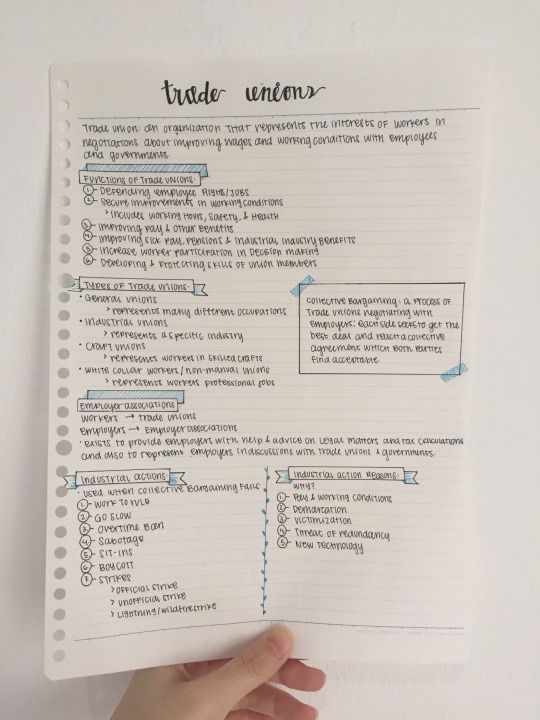
janurary 28 8:03pm // economics revision sheets for my chapter test tomorrow!
5K notes
·
View notes
Text
How to Study Like a Harvard Student
Taken from Sophia Chua-Rubenfeld, daughter of the Tiger Mother
Preliminary Steps
1. Choose classes that interest you. That way studying doesn’t feel like slave labor. If you don’t want to learn, then I can’t help you.
2. Make some friends. See steps 12, 13, 23, 24.
General Principles
3. Study less, but study better.
4. Avoid Autopilot Brain at all costs.
5. Vague is bad. Vague is a waste of your time.
6. Write it down.
7. Suck it up, buckle down, get it done.
Plan of Attack Phase I: Class
8. Show up. Everything will make a lot more sense that way, and you will save yourself a lot of time in the long run.
9. Take notes by hand. I don’t know the science behind it, but doing anything by hand is a way of carving it into your memory. Also, if you get bored you will doodle, which is still a thousand times better than ending up on stumbleupon or something.
Phase II: Study Time
10. Get out of the library. The sheer fact of being in a library doesn’t fill you with knowledge. Eight hours of Facebooking in the library is still eight hours of Facebooking. Also, people who bring food and blankets to the library and just stay there during finals week start to smell weird. Go home and bathe. You can quiz yourself while you wash your hair.
11. Do a little every day, but don’t let it be your whole day. “This afternoon, I will read a chapter of something and do half a problem set. Then, I will watch an episode of South Park and go to the gym” ALWAYS BEATS “Starting right now, I am going to read as much as I possibly can…oh wow, now it’s midnight, I’m on page five, and my room reeks of ramen and dysfunction.”
12. Give yourself incentive. There’s nothing worse than a gaping abyss of study time. If you know you’re going out in six hours, you’re more likely to get something done.
13. Allow friends to confiscate your phone when they catch you playing Angry Birds. Oh and if you think you need a break, you probably don’t.
Phase III: Assignments
14. Stop highlighting. Underlining is supposed to keep you focused, but it’s actually a one-way ticket to Autopilot Brain. You zone out, look down, and suddenly you have five pages of neon green that you don’t remember reading. Write notes in the margins instead.
15. Do all your own work. You get nothing out of copying a problem set. It’s also shady.
16. Read as much as you can. No way around it. Stop trying to cheat with Sparknotes.
17. Be a smart reader, not a robot (lol). Ask yourself: What is the author trying to prove? What is the logical progression of the argument? You can usually answer these questions by reading the introduction and conclusion of every chapter. Then, pick any two examples/anecdotes and commit them to memory (write them down). They will help you reconstruct the author’s argument later on.
18. Don’t read everything, but understand everything that you read. Better to have a deep understanding of a limited amount of material, than to have a vague understanding of an entire course. Once again: Vague is bad. Vague is a waste of your time.
19. Bullet points. For essays, summarizing, everything.
Phase IV: Reading Period (Review Week)
20. Once again: do not move into the library. Eat, sleep, and bathe.
21. If you don’t understand it, it will definitely be on the exam. Solution: textbooks; the internet.
22. Do all the practice problems. This one is totally tiger mom.
23. People are often contemptuous of rote learning. Newsflash: even at great intellectual bastions like Harvard, you will be required to memorize formulas, names and dates. To memorize effectively: stop reading your list over and over again. It doesn’t work. Say it out loud, write it down. Remember how you made friends? Have them quiz you, then return the favor.
24. Again with the friends: ask them to listen while you explain a difficult concept to them. This forces you to articulate your understanding. Remember, vague is bad.
25. Go for the big picture. Try to figure out where a specific concept fits into the course as a whole. This will help you tap into Big Themes – every class has Big Themes – which will streamline what you need to know. You can learn a million facts, but until you understand how they fit together, you’re missing the point.
Phase V: Exam Day
26. Crush exam. Get A.
238K notes
·
View notes
Photo
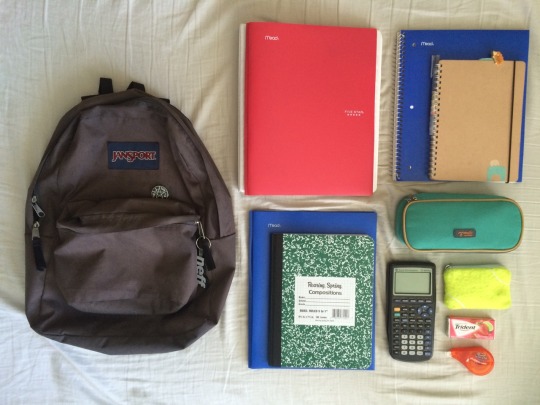
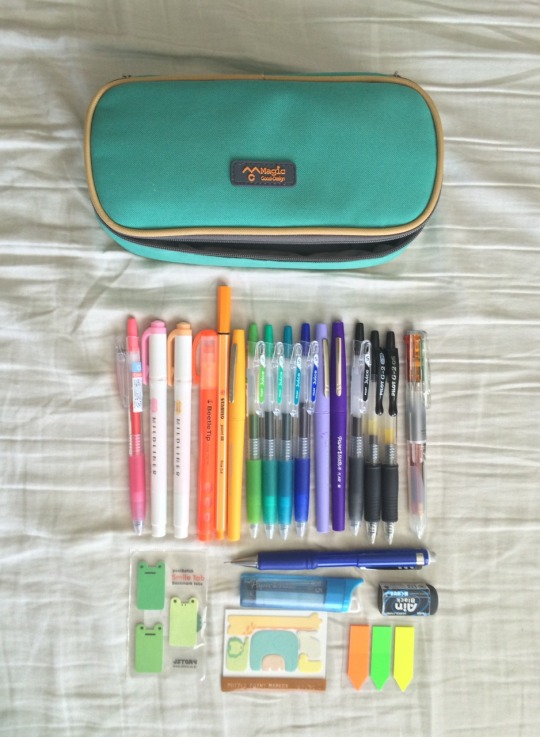
it may not be super studyblr aesthetic, but here’s what i keep in my backpack✏️📓
899 notes
·
View notes
Photo
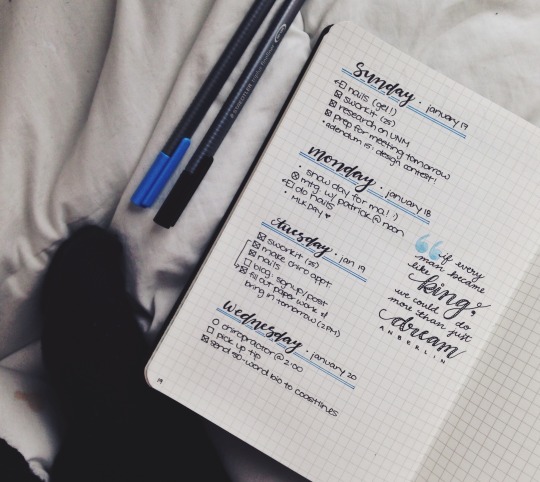
1.20.16 // “If every man became like King, we could do more than just dream.” - Anberlin
5K notes
·
View notes
Photo
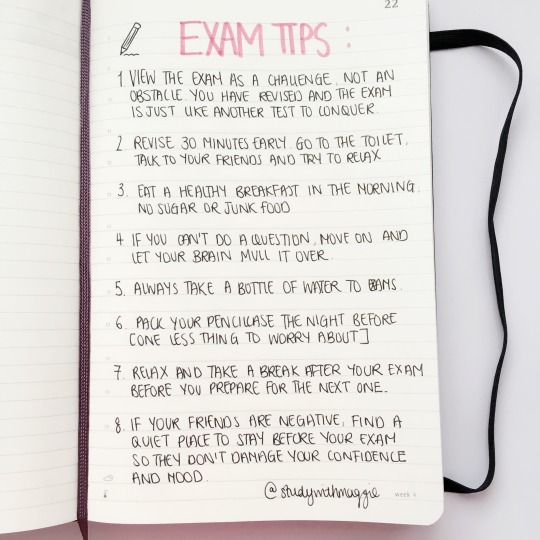
15/02/16 • Part 3 on how to take exams!
Taking exams is always such an anxious thing, and I know that under pressure, our performance can fall drastically. Try to reduce as much stress as possible by arriving early, eating well and putting yourself in the best mindset before the exam. You don’t want to run into your exam late (which will stress you out even more) or realise you’ve forgotten pens/pencils/a geometry set once you get into the exam hall.
Remember to take deep breaths and if you can’t do a question, it isn’t the end of the world!
7K notes
·
View notes
